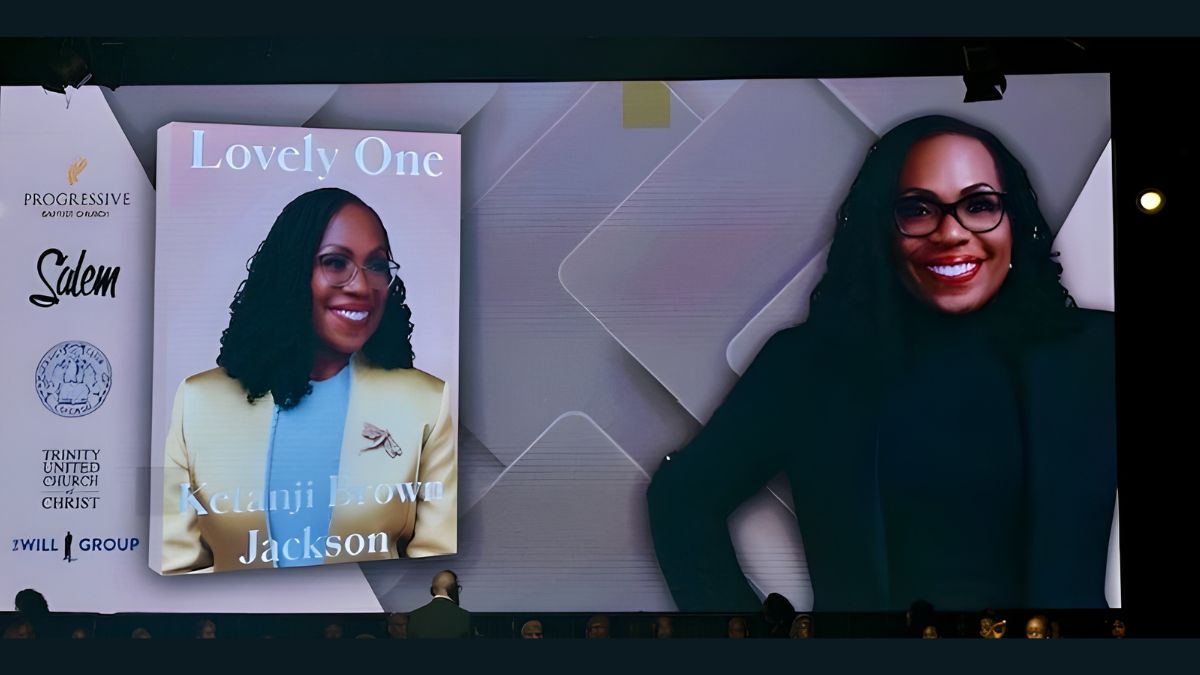Supreme Court Justice Ketanji Brown Jackson celebrated the launch of her memoir, Lovely One, at Chicago’s Salem Baptist Church of Chicago (Photo Credit: Inez Woody).
Last Wednesday night, Feb. 19, Salem Baptist Church of Chicago brimmed with anticipation as two titans of Black history came together for an unforgettable evening. Long pastored by Rev. Dr. James Meeks, the church welcomed guests to celebrate the book launch of Supreme Court Justice Ketanji Brown Jackson’s “Lovely One.”
With Pastor Rev. Dr. Charlie Dates as the evening’s gracious host, the atmosphere was both reverent and joyful, setting the perfect stage for inspiration and reflection.
The event was organized by Jessica Ashley Garmon, a remarkable woman who seamlessly balances her roles as a mother, wife, sister, lawyer and entrepreneur, showcasing the incredible strength of Black women. Garmon expressed heartfelt gratitude to everyone involved, from the parking staff to the choir, each playing a vital role in making the night a resounding success.
The evening was graced by a powerhouse choir, a collaboration between Salem and Progressive Baptist Church, dressed in all black and accompanied by a live orchestra. Their stirring renditions of traditional gospel songs, old Negro spirituals and the Black National Anthem filled the sanctuary, uplifting the audience and moving many to tears. As the congregation clapped, sang and praised God, the palpable presence of the Holy Spirit set the stage for the historic arrival of Justice Ketanji Brown Jackson.
When the crowd erupted in thunderous applause, Garmon introduced Justice Jackson alongside Isabel Wilkerson, the first African-American woman to win a Pulitzer Prize. “Tonight, we have two women monumental in Black history,” Garmon declared, emphasizing the significance of their gathering in Chicago, an epicenter of the Great Migration.
Radiating warmth and humility, Justice Jackson began by reading the preface of “Lovely One,” named for the meaning of her African name, Ketanji. Her reflections on the surreal experience of adding her name to the list of Supreme Court justices resonated deeply.
She recounted the moment of her swearing-in using the Harlan Bible, a historic artifact held by her husband, Dr. Patrick Jackson, symbolizing her connection to the legacies of those who came before her, especially Thurgood Marshall, the Supreme Court’s first African-American justice.
The conversation turned to her preparation for the Senate confirmation hearings—a grueling process that demanded immense emotional resilience.
“It took a lot of practice,” she shared, contrasting her 2.5 weeks of preparation with the typical six weeks afforded to others in her position. With profound insight, she described the challenges and support she encountered, realizing that her performance was as much for the public as it was for herself.
Wilkerson, who interviewed Jackson, noted the weight of the moment.
“We all watched every second of it,” she remarked, highlighting the tension of the hearings, which Jackson navigated with scrutiny and grace. Justice Jackson spoke candidly about her emotional journey, recalling how Senator Cory Booker chose not to ask her questions at a pivotal moment, allowing her to rest. His heartfelt words, recognizing her worthiness and ancestral connection, brought tears to her eyes—a moment that encapsulated the spirit of the evening.
Throughout the night, Justice Jackson shared anecdotes that vividly illustrated her upbringing. She spoke of her grandmother’s resilience, the pride her parents instilled in her and the significance of her African name.
“I stand on the shoulders of the people who came before me,” she declared, acknowledging that while she is the first Black woman on the Supreme Court, she is not the only one who could have held that position.
The event also showcased strong community support, with many Black judges, attorneys and law students from Chicago in attendance. The sight of judges in their robes, accompanied by the soulful music of the choir, served as a powerful reminder of the progress made and the legacy still unfolding.
As Isabel Wilkerson and Justice Ketanji Brown Jackson engaged in dialogue, they urged the audience to recognize the importance of their history and the necessity of perseverance.
“We are the sum total of our ancestors,” Wilkerson said, a message that resonated deeply throughout the room.
This night at House of Hope was more than just a book launch; it was a celebration of legacy, resilience and the promise of the future.
Justice Jackson’s presence in Chicago stood as a testament to the power of community, the importance of history, and the hope that lies in the hearts of those committed to the fight for justice.



